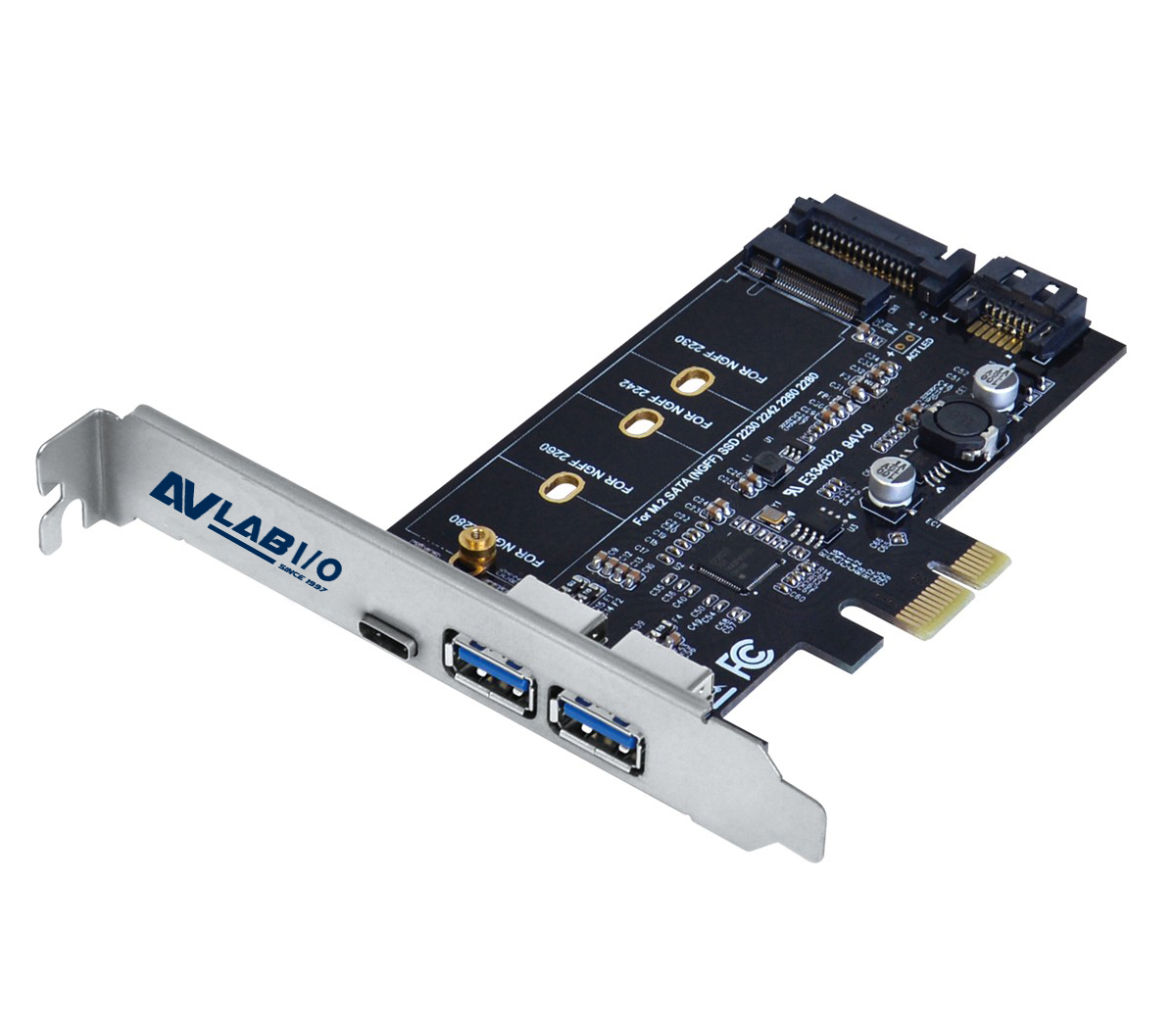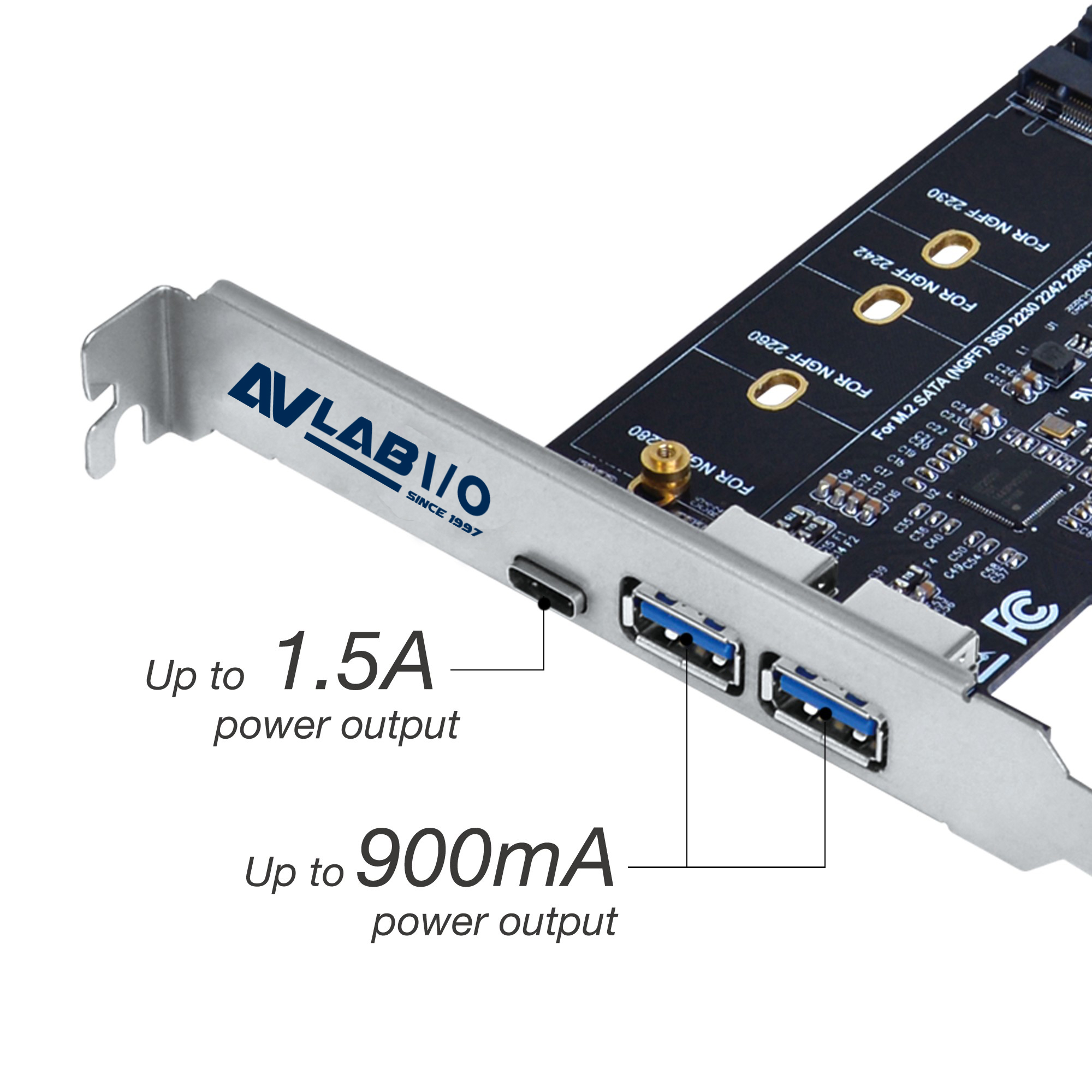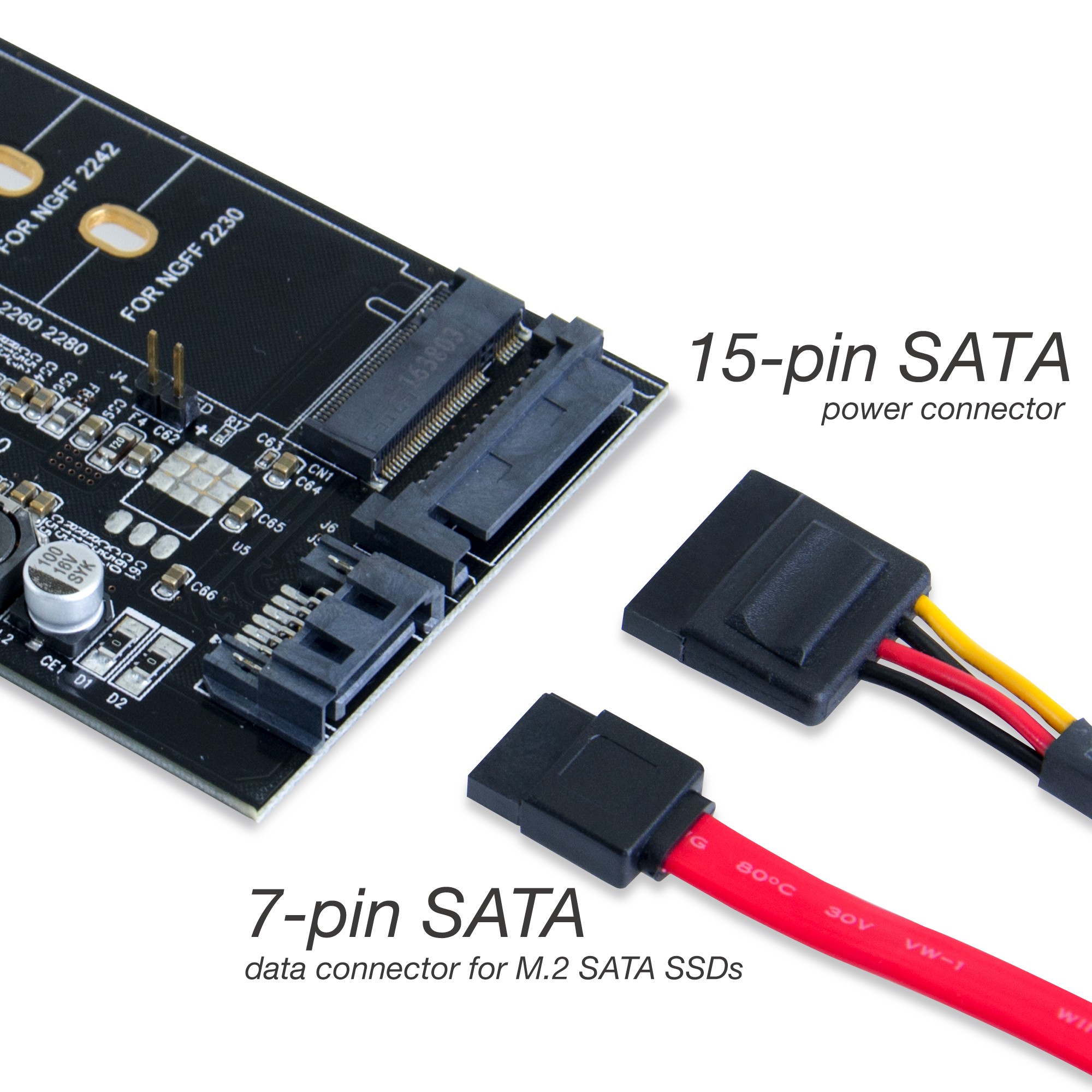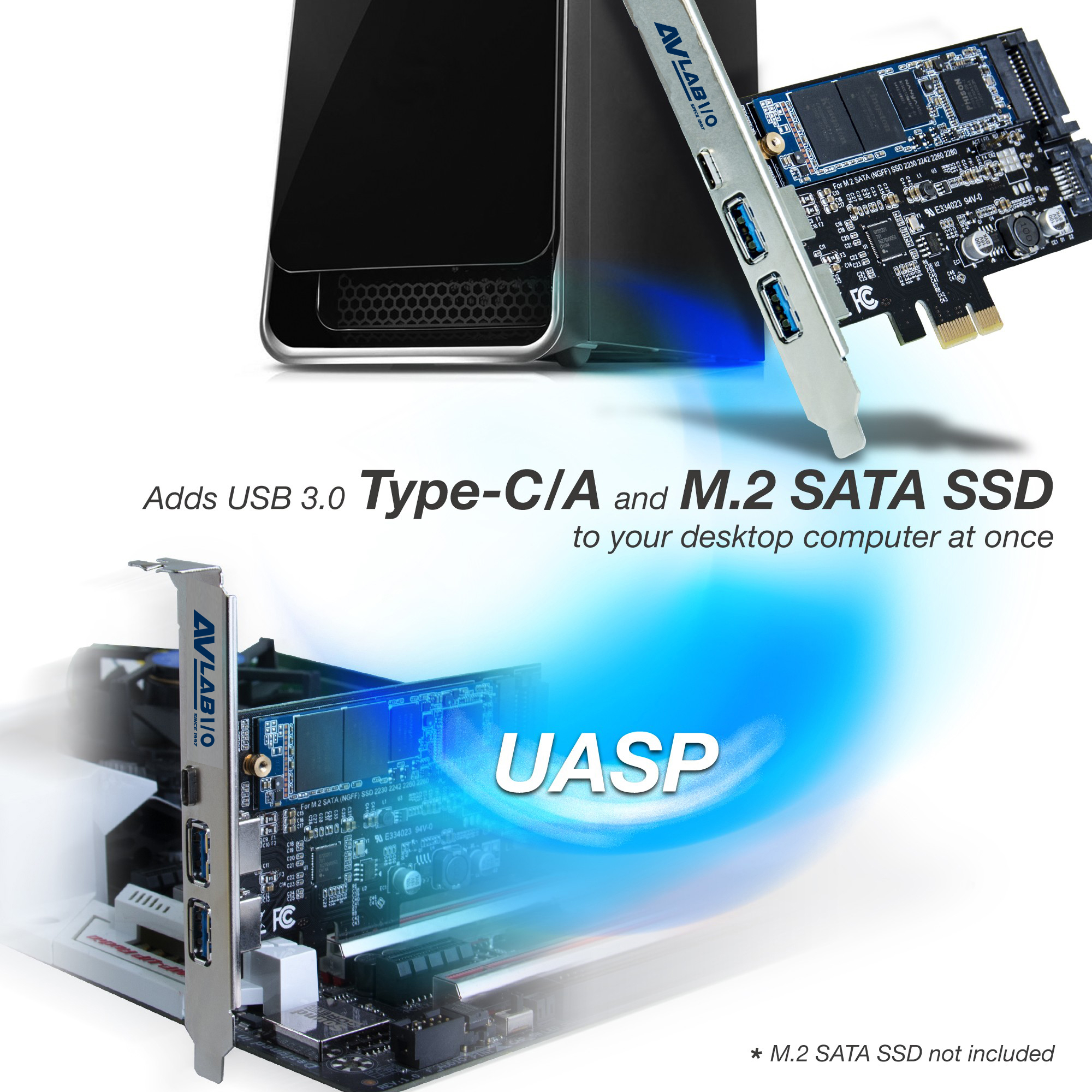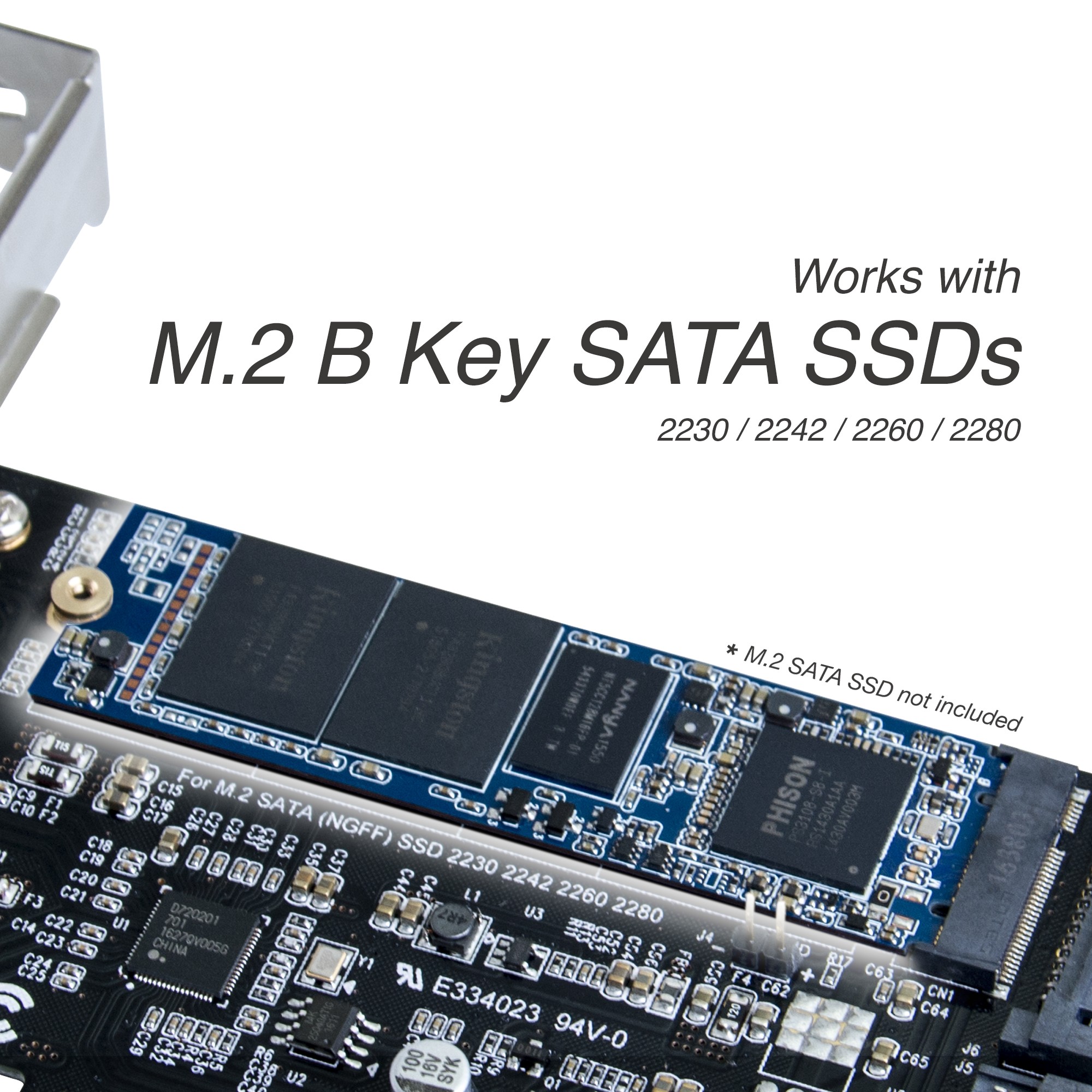- AVLAB-US11-1
- AVLAB 3-Port USB 3.0 Type-A/C PCIe with M.2 SSD Adapter, 2230/2242/2260/2280, B Key M.2 SATA SSD
■ Installs into standard height or low profile system chassis with the included bracket ■ Performance enhanced combination: Upgrade system performance and connection instantly with one M.2 slot (B key), one USB 3.0 Type-C and two USB 3.0 Type-A through a PCI Express slot ■ Fully compliant with 2230, 2242, 2260 and 2280 form factor B key M.2 SATA SSDs via multiple mounting holes Note: This adapter is not compatible with M.2 PCIe SSDs ■ Each USB Type-A port delivers up to 900mA and Type-C up to 1.5A power output with Over-Current protection to further protect your connected peripherals ■ Versatile USB Type-C and Type-A connectivity combination, expands system’s connectivity options for maximum productivity ■ Faster speeds: USB ports support UASP (USB Attached SCSI Protocol), which increases transfer speeds, great for backing up data such as HD videos and high-resolution photos
Highlights
Installs into standard height or low profile system chassis with the included bracket
Performance enhanced combination:
Upgrade system performance and connection instantly with one M.2 slot (B key), one USB 3.0 Type-C and two USB 3.0 Type-A through a PCI Express slot
Fully compliant with 2230, 2242, 2260 and 2280 form factor B key M.2 SATA SSDs via multiple mounting holes
Note: This adapter is not compatible with M.2 PCIe SSDs
Each USB Type-A port
delivers up to 900mA and Type-C up to 1.5A power output with Over-Current protection to further protect your connected peripherals
Versatile USB Type-C and Type-A
connectivity combination, expands system’s connectivity options for maximum productivity
Faster speeds:
USB ports support UASP (USB Attached SCSI Protocol), which increases transfer speeds, great for backing up data such as HD videos and high-resolution photos
Specification
Chipset: Renesas uPD720201
Bus connector: PCI Express x1
Compatible with PCI Express 2.0
Data transfer rate: Up to 5Gbps
USB power output:
■ Type-C: Up to 1.5A
■ Type-A: Up to 900mA
Drive type: B key M.2 SATA SSD (not included)
Not compatible with M.2 PCIe SSDs
Compatible SSD drive form factor: 2230 / 2242 / 2260 / 2280 (30 / 42 / 60 / 80mm)
Connectors:
External:
■ 2 x USB 3.0 Type A, Female, Data
■ 1 x USB 3.0 Type-C, Female, Data
Internal:
■ 1 x M.2 slot (B key)
■ 1 x 7-pin SATA, data connector
■ 1 x 15-pin SATA, power connector
Product:
■ Dimensions: 4.72" (W) x 5.00" (H) x 0.79" (D)
■ Weight: 0.11 lbs
■ Color: Black
Environmental conditions:
■ Operating temperature: 32 to 122 degrees F
■ Storage temperature: 14 to 140 degrees F
■ Relative humidity: 5% to 90% RH (non-condensing)
Certifications/Standards: FCC, RoHS
Warranty: 1 year limited
Country of origin: Taiwan
FAQ
- Q: What is USB Type-C?
- USB-C is a type of USB connector that is capable of supporting the following: ■ Data transfer speeds up to 10Gbps, if you use USB 3.1. ■ Bi-directional power delivery up to 100W, if both the USB host connection and the device support it. ■ Alternate modes, which deliver different types of data at different speeds. For example, DisplayPort Alternate Mode (DP Alt Mode). If using Thunderbolt 3 over USB-C, the connection is capable of additional features. For example, Thunderbolt 3 is capable of 40Gbps of total bandwidth. Not all USB-C ports or devices are capable of supporting all of the features listed above, or all of the features at the maximum capabilities. If you require a specific USB-C feature, your USB host connection, cables, and device must all support the feature that you require. For more information about whether your components support specific USB-C features, refer to the information provided by the manufacturers.
- Q: How do I confirm that Windows detects my USB device?
- To confirm that Windows detects your USB device, complete the following: Press the Windows key+R, type devmgmt.msc, and press Enter. In Device Manager, under the appropriate heading, confirm that your expansion card is listed and that there isn't an exclamation mark next to it. For example, a USB device would be under Universal Serial Bus controllers.
- Q: How do I confirm that Windows detects my expansion device?
- To confirm that Windows detects your expansion card, complete the following: Press the Windows key+R, type devmgmt.msc, and press Enter. In Device Manager, under the appropriate heading, confirm that your expansion card is listed and that there isn't an exclamation mark next to it. For example, a USB device would be under Universal Serial Bus controllers.




